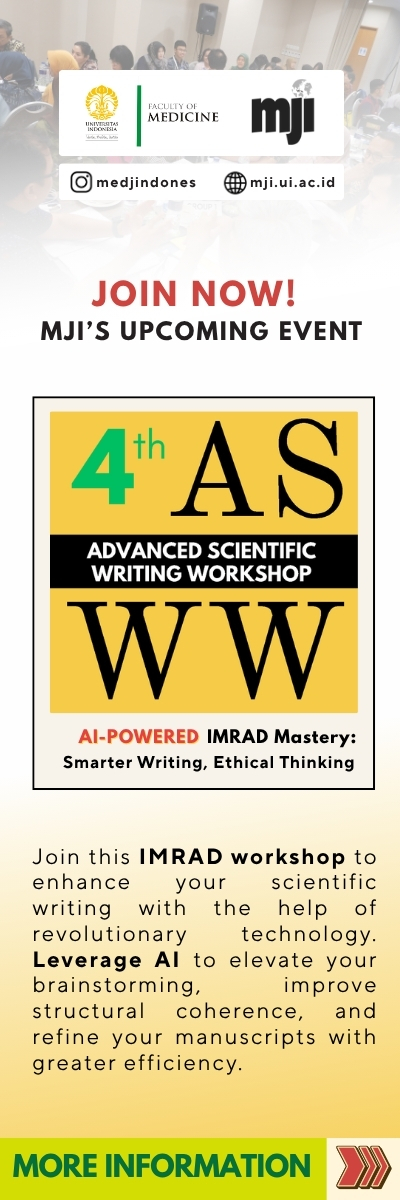A case report of moyamoya disease in children treated with encephalo-duro-myo-arterio-pericranial synangiosis
DOI:
https://doi.org/10.13181/mji.cr.204452Keywords:
encephalo-duro-myo-arterio-pericranial synangiosis, moyamoya disease, stroke, surgery, transient ischemic attackAbstract
Moyamoya disease that manifests during childhood may pose a special challenge for surgeons. We report a case of a 10-year-old girl who suffered from moyamoya disease and was successfully treated with encephalo-duro-myo-arterio-pericranial synangiosis (EDMAPS). She presented with a recurrent transient ischemic attack that worsened for 1 year. She was aphasic globally (sensory and motor) and had slightly weak right extremities. Her magnetic resonance angiography and computed tomography angiography showed the typical features of moyamoya disease with bilateral stenosis at the terminal internal carotid artery, bilaterally abnormal vascular networks, and a left ischemic event involving the temporoparietal region. She was recovered well after underwent bilateral EDMAPS, fully regained her language function after 3 months, and gathered her strength back. Therefore, EDMAPS could be a good, safe, and effective treatment for moyamoya disease in children.
Downloads
References
Kuroda S, Houkin K. Moyamoya disease: current concepts and future perspectives. Lancet Neurol. 2008;7(11):1056-66. https://doi.org/10.1016/S1474-4422(08)70240-0
Scott RM, Smith ER. Moyamoya disease and moyamoya syndrome. N Engl J Med. 2009;360(12):1226-37. https://doi.org/10.1056/NEJMra0804622
Yamada I, Suzuki S, Matsushima Y. Moyamoya disease: comparison of assessment with MR angiography and MR imaging versus conventional angiography. Radiology. 1995;196(1):211-8. https://doi.org/10.1148/radiology.196.1.7784569
Katz DA, Marks MP, Napel SA, Bracci PM, Roberts SL. Circle of Willis: evaluation with spiral CT angiography, MR angiography, and conventional angiography. Radiology. 1995;195(2):445-9. https://doi.org/10.1148/radiology.195.2.7724764
Nagiub M, Allarakhia I. Pediatric Moyamoya disease. Am J Case Rep. 2013;14:134-8. https://doi.org/10.12659/AJCR.889170
Kim T, Oh CW, Bang JS, Kim JE, Cho WS. Moyamoya disease: treatment and outcomes. J Stroke. 2016;18(1):21-30. https://doi.org/10.5853/jos.2015.01739
Uchino H, Kim JH, Fujima N, Kazumata K, Ito M, Nakayama N, et al. Synergistic interaction between direct and indirect bypasses in combined procedures: the significance of indirect bypasses in moyamoya disease. Neurosurgery. 2016;80(2):201-9. https://doi.org/10.1227/NEU.0000000000001201
Amin-Hanjani S, Singh A, Rifai H, Thulborn KR, Alaraj A, Aletich V, et al. Combined direct and indirect bypass for moyamoya: quantitative assesment of direct bypass flow over time. Neurosurgery. 2013;73(6):962-7. https://doi.org/10.1227/NEU.0000000000000139
Kuroda S, Houkin K, Ishikawa T, Nakayama N, Iwasaki Y. Novel bypass surgery for moyamoya disease using pericranial flap: its impacts on cerebral hemodynamics and long-term outcome. Neurosurgery. 2010;66(6):1093-101. https://doi.org/10.1227/01.NEU.0000369606.00861.91
Hori S, Kashiwazaki D, Akioka N, Tomohide H, Hori E, Umemura K, et al. Surgical anatomy and preservation of the middle meningeal artery during bypass surgery for moyamoya disease. Acta Neurochir. 2015;157(1):29-36. https://doi.org/10.1007/s00701-014-2282-7
Published
How to Cite
Issue
Section
License
Authors who publish with Medical Journal of Indonesia agree to the following terms:
- Authors retain copyright and grant Medical Journal of Indonesia right of first publication with the work simultaneously licensed under a Creative Commons Attribution-NonCommercial License that allows others to remix, adapt, build upon the work non-commercially with an acknowledgment of the work’s authorship and initial publication in Medical Journal of Indonesia.
- Authors are permitted to copy and redistribute the journal's published version of the work non-commercially (e.g., post it to an institutional repository or publish it in a book), with an acknowledgment of its initial publication in Medical Journal of Indonesia.





































